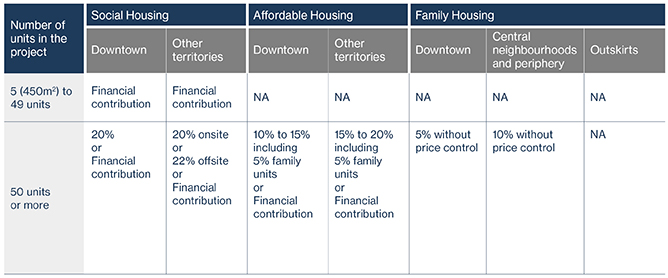Aug. 19, 2024 - Following the Canadian Competition Bureau’s 2023 Retail Grocery Market Study in which it recommended that provincial and territorial governments take measures to limit property controls in the grocery industry, including banning their use, the Bureau recently released for public comment a...
City of Montréal Publishes Bylaw 20-20-20 on Social, Affordable and Family Housing
Read our updated bulletin dated November 6, 2020.
The City of Montréal has published a bylaw known as “20-20-20” aimed at promoting the construction of social, affordable and family housing as part of real estate development projects. The terms of this bylaw were eagerly awaited by the real estate industry.
The proposed By-law to improve the supply of social, affordable and family housing was studied by the executive committee of the City of Montréal (City) on June 12, 2019, and was on the agenda of the City council's public meeting on June 17.
The bylaw will replace the Strategy for the inclusion of affordable housing in new residential projects (Inclusion Strategy) adopted in 2005 and revised in 2015, which applied to projects (with at least 100 units) that required significant regulatory change. The Inclusion Strategy aimed to secure 15% of social housing and 15% of affordable housing per project and allowed for a financial contribution instead of building this type of housing.
Key Concepts
For the purposes of the bylaw, housing is defined as follows:
- social housing, means housing whose construction is subsidized by a social and community housing program run by the Québec government;
- affordable housing, means housing with a rental or purchase price below the ceilings defined by the bylaw;
- family housing, means housing that has at least three bedrooms and sufficient space for a family namely, a gross area of 86 m2 (925.7 sq ft) for the “downtown” and “inner neighbourhoods” territories, and a gross area of 96 m2 (1,033.33 sq ft) for the “periphery” and “outskirts” territories (see attached plan available only in French).
Scope of Application
The bylaw will apply
- in all boroughs of the City (see attached plan available only in French); and
- to all residential projects of 450 m2 or more (4,853 sq ft), except those:
- for the purpose of building student residences owned by a public or non-profit organization;
- aimed exclusively at the construction of social or community housing;
- for the construction of affordable rental housing by a non-profit organization or cooperative receiving public financial assistance;
- where more than 80% of the units benefit from a program of a municipal or government authority to reduce a buyer's down payment to less than 5% of the selling price;
- carried out on land sold by the City and for which an agreement including obligations regarding the supply of housing has already been concluded; or
- that constitute a senior residence within the meaning of the bylaw (partial exemption).
Agreement with the City
The issuance of a building permit will be conditional on the conclusion of an agreement with the City and the delivery to the City of the guarantees provided for in the agreement. Although this may not be the case in the future, it is worth recalling that the guarantees granted by developers under the current Inclusion Strategy regime generally take the form of a bank letter of guarantee or a mortgage.
In the case of a multi-phase project, a framework agreement must be concluded for the entire project before the first phase permit is issued and will remain applicable until the project is completed. The contributions to be paid by the developer will be determined with consideration for the number of units and residential area of all project phases.
Contributions
For a project involving between 5 and 49 housing units, the contribution must be financial. No affordable and family housing contributions will be required for these projects.
For a project of 50 or more units, the social housing contribution may take the form of a financial contribution, the transfer of a building (vacant land or turnkey project) or a combination of both. These requirements will vary depending on the territory of the City in which the project is located. An additional contribution, also variable according to the territory of the City, will be required for affordable housing and family housing.
The following table, prepared by the City, provides a summary portrait of the contributions provided for in the bylaw.
Transitional Regime
The bylaw is scheduled to enter into force on January 1, 2021. Until then, the Inclusion Strategy continues to apply. However, the Inclusion Strategy will be modified to better reflect the objectives of the, including the developers’ contribution thresholds as set out in more detail in the bylaw.
The bylaw will not apply, under certain conditions, to projects for which a written social housing agreement had already been signed with the City prior to June 17, 2019 , under the Inclusion Strategy.
Projects in their own right – that is, those that do no zoning change or other regulatory amendment and are not subject to the Inclusion Strategy– benefit from a stay between the planned adoption and the coming into force of the bylaw on January 1, 2021.
Next Steps
The Office de consultation publique de Montréal will conduct a public consultation on the proposed bylaw in the fall of 2019.
The final adoption of the bylaw is expected in early 2020 and its coming into force on January 1, 2021.
It should be noted that despite requests from industry representatives, projects in their own right that were not previously subject to the Inclusion Strategy and that will now be subject to the bylaw, will not be compensated by a “zoning bonus” such as increased construction density or otherwise more favourable zoning.
Key Contact
Expertise
Related
Protection de l’environnement : le gouvernement du Québec veut légaliser l’expropriation déguisée
Dec. 11, 2023 - Translation in progress. L’Assemblée nationale a adopté, le 8 décembre dernier, des dispositions qui impacteront de manière draconienne les propriétaires dépossédés de leur terrain par un règlement municipal. Atteinte justifiée au droit de propriété Bien que...



